We need GOOD practice, not common practice
15 Replies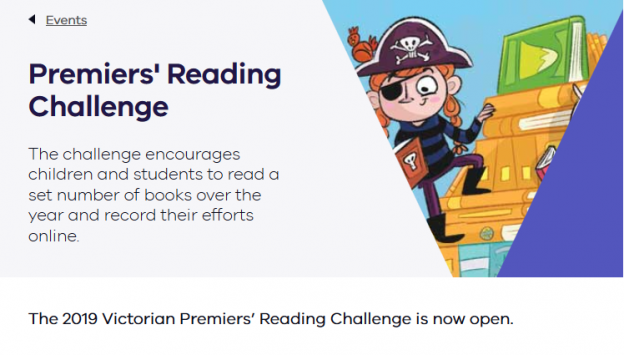
I wrote an opinion piece in The Age newspaper this week called “Premiers’ Reading Challenge no fun for kids who can’t read“, arguing we need to close the gap between research and practice in early literacy education, so more kids can enjoy, not dread, the Premiers’ Reading Challenge.
I hope it’s helped put another nail in the coffin of common, but extremely poor, literacy-teaching practices like rote wordlist-memorisation (the “magic words” etc) without regard to their structure, incidental-not-systematic phonics, and encouraging kids to guess words from first letter, sentence structure and context/pictures.
I hope it also helps kill off the idea that reading is natural, and replace educational blah-blah about reader identity and teacher literacy philosophy with more interesting discussions about what science tells us about how to best teach reading.
I’m sorry they didn’t include my link to Emily Hanford’s great “Hard Words: why aren’t kids being taught to read” audio documentary, but otherwise happy with it, especially the mention of David Kilpatrick’s seminar on 19 August at Melbourne Town Hall (have you signed up yet? He will also speak in Perth and Cairns, and Sydney and Adelaide, but they’re booked out).
Of course letters to the editor appeared the next day disagreeing with me. People who agree with something they read in the paper don’t generally rush to write to the editor. Editors don’t usually give a right of reply to these letters, so I’m giving myself one here.
A couple of the letters will have made many teachers cringe for their profession. Their authors seem blissfully unaware of the work of researchers like Marilyn Jager Adams, Stanislas Dehaene, Maryanne Wolf, Mark Seidenberg, Louisa Moats, David Kilpatrick, and Anne Castles, Kathleen Rastle and Kate Nation.
It’s kind of embarrassing that there are still teachers out there defending ideas and approaches reading researchers have long shown are bunkum. But here’s one letter:
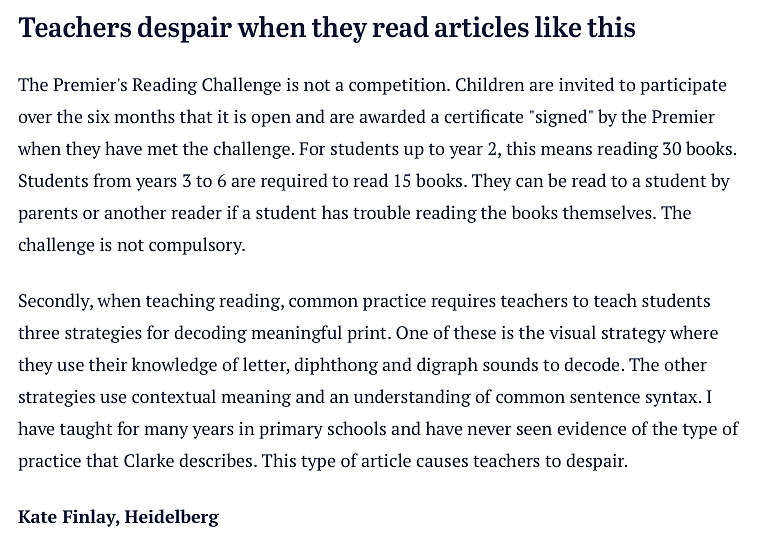
Like a zombie that just won’t die, the common “three strategies” practice she describes (usually called the “three-cueing method” or “multicueing”) has no scientific basis. It’s a great way to teach the habits of weak readers, not strong readers.
It’s based on the always-dumb, half-baked idea that reading is a psycholinguistic guessing game, rather than a precise, skilled, learnt behaviour.
It’s hard to know what to say when someone succinctly describes something you’ve called poor practice, calls it “common practice” and then asserts that the poor practice you’ve described does not occur in schools. Since this letter was published on World Emoji Day, I think I’ll just say

Also (oh kill me with a spoon), a “digraph sound” is not a Thing. Can teachers of reading please be given a basic grasp of phonics terminology?
I checked the Premiers’ Reading Challenge rules, and can’t find any mention of it being OK for kids to count books they’ve listened to someone else read, not read themselves. Maybe you can.
I hope what I write doesn’t just drive literacy teachers who aren’t interested in the science of reading to despair. I hope it drives them to retirement. People who aren’t interested in the science of teaching reading should not be teaching reading.
Here’s another letter from a Dr Jennie Duke of the Literacy Alliance Group. I have never heard of this group, so I googled it. Sadly, Google seems not to have heard of it either.
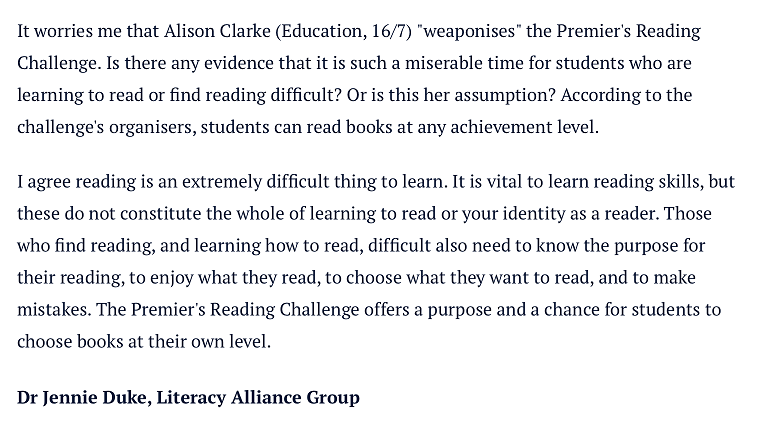
Dr Duke clearly hasn’t sat through a whole-school, waste-of-time Drop Everything And Read session during the Premiers’ Reading Challenge as I have, watching kids pretend to read books that are simply too hard for them, to save face with their peers.
A third letter argues meaning comes first, and reading is “a naturally acquired acquisition”.
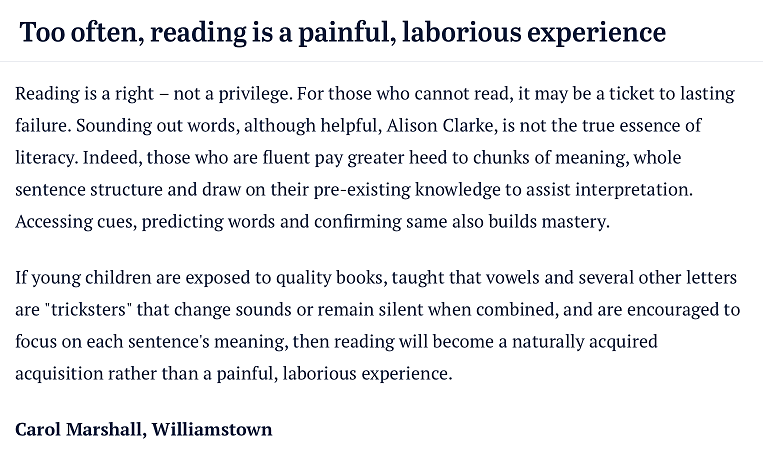
I’m not sure why the meaning-first brigade are so shy of asking kids to do important but hard work. As Stanislas Dehaene explained to us at the Language, Learning and Literacy conference earlier in the year, learning to read is at first very effortful, but if you don’t put in the effort to build the reading circuit linking vision and language in your brain, you’ll read poorly.
Building this reading circuit is a lot harder for some kids than others. Quality books, a smattering of phonics tricks and a focus on meaning are not going to cut it for the kids who currently inhabit the long tail of literacy under-achievement, and aren’t going to permanently arrest then reverse our medium-term measurable decline in reading standards.
Happily, we now seem to be getting a bit of leadership from the International Literacy Association regarding the place of systematic, explicit phonics in early literacy teaching. Here’s their 2019 brief on the topic, which asks:
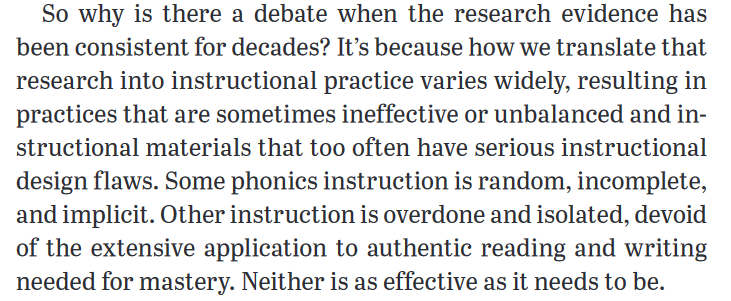
I hope this leadership helps ALEA, PETAA and the AARE bloggers catch up.
Also, happily for me, the Age letters editor did publish a letter supporting my article:
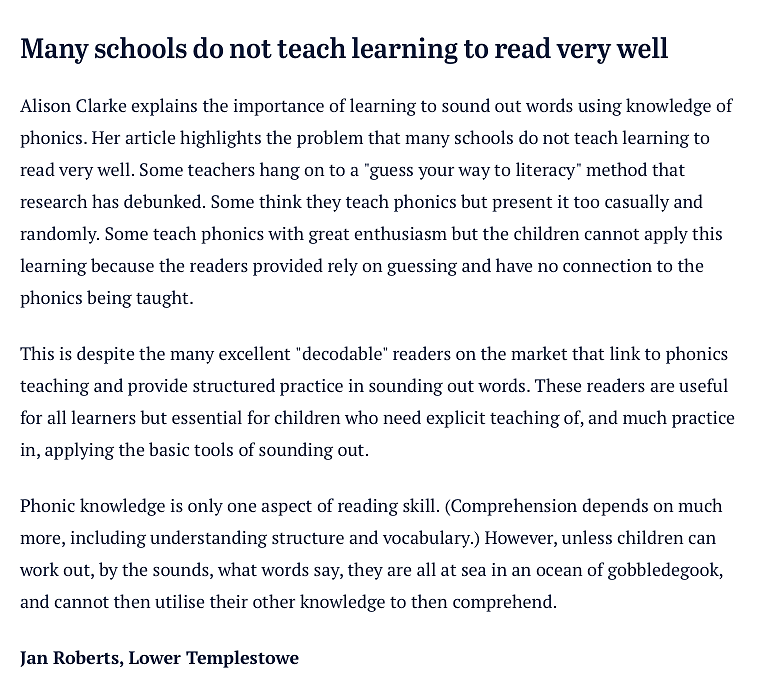
Thanks, Jan!
I’ll give the last word to another letter submitted to the Age editor by Dr Tanya Serry of La Trobe University, but not published, which I think deserves wider circulation, and again my thanks:
Kate Finlay and Carol Marshall (letters 17 Jul 2019), in response to Alison Clarke’s previous letter, both describe ‘methods’ for reading instruction that do not align with the empirical evidence.
Goodman’s Psycholinguistic Guessing Game; which includes visual strategies among others, has long been discredited by advances in Cognitive Psychology research.
Systematic instruction in Phonics, as noted by Alison Clarke, essentially enables children to ‘crack the alphabetic code’ and is far more intellectually rigorous than teaching children ‘tricks’ with various letters of the alphabet.
Further, in support of Alison Clarke’s support for explicitly-taught systematic phonics, anyone who reads the scientific evidence on teaching children to read, will find clear statements that phonics alone will never be sufficient. It is now well-established that phonics must be embedded into a comprehensive program alongside instruction in phonemic awareness, reading fluency, vocabulary and oral language comprehension.
In light of the very recent ‘Short-Changed’ report by Buckingham and Meeks, who meticulously and objectively documented widespread shortcomings about the preparation of teachers to teach reading, we should all take heed of the vast amount of high-quality empirical research available to us all about how best to teach all children to read and to support those who struggle.



Well done Alison! I cringed when I read the letters in The Age. It will take another generation to change.
Hi Alison
I am a pre-service early childhood teacher who has just discovered your website. Lots of food for thought. Thankyou! Regards Jacinta
Hi Jacinta, I hope that you find the information on my website helpful, and that if there are phonemic awareness, phonics, morphology or other gaps in your course, it helps to fill them in a positive way. We can all do better when we know better, including me. Alison
Do you reckon if there was an article about vaccination and then replies that were anti-vaccination they would publish the replies??? It seems to be an impossible task to get people to understand that we are talking sound, settled science not opinion – I despair really. The article was one of the most cogent explainations I’ve seen – your blog a fantastic response. More power to you.
Thank you! Nice anti-vax analogy. My dad and aunt both had diphtheria and my uncle had polio, so anti-vaxers are another group that makes me mad as fire. Ditto climate sceptics when climate scientists all say we are in a climate emergency.
Hi Alison, Loved your article and was shocked to see the letters that The Age chose to publish (with the exception, of course, of Jan’s excellent reply). The acronym for the backward ideas of the LIteracy Alliance Group says it all…
I also wrote a letter that didn’t get in. Hope you don’t mind me including it here, but just want you to know there were lots of people supporting you.
“In the recent spate of letters on how children learn to read, all but one defies common sense.
I am confused (Letters 17/7) as to how children who find reading a ‘difficult’, mistake-making activity could then enjoy reading as is claimed. They are the very children who are feeling embarrassed and incompetent as they watch their classmates reading complex chapter books for the Reading Challenge.
Also, how does one come at an unfamiliar word by using the context of the text if one has never seen or heard that word before? And how does one determine the meaning of a sentence without being able to read the words contained in that sentence? How can ‘predicting’ words be an easier strategy than actually sounding out the word with all its letters plain to see?
These ‘strategies’ so espoused are why we have so many children unable to read skilfully today. And it is disappointing to see that the Age has chosen to publish four letters in support of these damaging methods and just one giving the common sense, scientific view: that for comprehension of a text to happen, children first need to be explicitly taught the sounds and letters of the words themselves. Publishing letters promoting flawed methods is akin to publishing letters from climate deniers and anti-vaxxers.”
Ha, the LAG! Hilarious. I love your letter and wish they’d published it, thankyou, but I guess conflict is one of the things that sells newspapers. The really amazing thing is how approaches that make no sense and lack proper evidence became mainstream in the first place, and how hard they are to get rid of. I guess we just have to keep banging on about this till they are (sadly my website doesn’t do smileys or thumbs up).
Thank you for mentioning the Advancing Literacy Practices Alliance in your Blog. We are a growing Alliance of parents, teachers, academics and community members.
We have a couple of points to respond to.
“This makes it much harder to learn to read as an adult. We see this in the slow progress of most adult learners. It’s a bit too late for their brains to re-specialise” –
actually as someone who has taught tons of adults to read, they generally learn much quicker than small children – the reason they often progress more slowly is that children spent 6
Or more hours a day in class, whereas adult learners rarely get more than a few hours a week tuition. If they are lucky enough to do a full time course, many adults can learn to read in a few months.
….
Next quote: ‘Dehaene says, “Reading is never global or whole word, especially not in children”.
…. Except for 1 billion Chinese.
…..
Finally: ‘Our brains have a circuit which specialises for recognising writing gestures.’ What is the empirical evidence for this? How do they know?
I didn’t mention the Advancing Literacy Practices Alliance in my blog, I’ve never heard of it. What is the URL of its website? How does one join? Is this a new name for the Literacy Alliance Group, now that Berys D has pointed out its acronym? Who and where are you? Usually when people comment on blogs they do so under their own names.
Yes of course adults can learn to read given the right intervention, but they must respecify voxels for letters which have already been specified for faces and objects, and this is harder in the less neuroplastic adult brain than in young children. Adults have other learning advantages which compensate to some extent, like being able to sit still and concentrate for longer, and having a better idea of the consequences of not learning.
Chinese writing is morphophonetic (symbols representing both meaning and sound), this article nicely explains why languages get the orthography they deserve: https://journals.sagepub.com/doi/10.1177/1529100618772271, I think Kathleen Rastle is the author who has done the most research on this area.
Re your last question, perhaps watch this video, and better acquaint yourself with the work of Stanislas Dehaene.
I’ve made that emoji face many many times at staff and system PDs.
Thank you so much Alison. My kids attend a public school in Sydney and they have been taught to guess read using pictures in their readers. Not only are my boys so behind in reading but they have still not been able to sound out their words correctly. This is because they have not been taught how to read but taught how to guess. This is nothing but lazy teaching in my view. It gives teachers the excuse to not put effort. I am a secondary teacher as well and have seen this first hand. This is why kids struggle to complete complex tasks by the time they reach year 7. If they’re not taught how to read then how can they read complex works in high school?! Each year I have to choose “easy” “dumbed down” information to pass to my students because of their lack of skills in reading rich texts. It is sad indeed. I do not blame primary teachers at all they’re just following the Australian curriculum. I blame the education system! But we as teachers can make changes now within a school setting. Let us ditch this pathetic useless lazy method of guess work and so called bringing past experiences to reading (I find laughable hahaha yes a 5 year old child has so much past experiences to do this) and practice back up scientific research of phonemic reading!
I think secondary teachers should really take this issue up with their primary school colleagues, because how on earth are you meant to get through YOUR curriculum when so many kids can’t read well enough? The impact on your differentiation workloads, and the stress of having to deal with all the bad behaviour caused by kids deciding they’d rather be perceived as the naughty kid not the dumb kid, is really not OK. If the AEU could come out in favour of early code-based instruction, as the ILA now has (woohoo! At last! See https://literacyworldwide.org/docs/default-source/where-we-stand/ila-meeting-challenges-early-literacy-phonics-instruction.pdf. I would never have believed it if I hadn’t seen it), then we will be getting somewhere. All the best with helping your kids catch up. Alison
Thank you so much! By the way I have been working on reading with them at home using your amazing spelfabet workbooks and your recommended decodable readers. They have improved steadily!
OMG…
I’m in my final semester of a postgrad Masters of Learning and Teaching (Primary) and just came across your blog. I have been following the rabbit hole all day. I’m actually really pissed off…we are given reams and reams of theory and obscure readings that we can’t ever hope to engage with in any depth, but no clear instruction about ‘best methods’ (but it soon becomes clear where our lecturer’s preference lies). We spend a HUGE proportion of time studying how we should dance around diversity (EAL/D, Aboriginal and Torres Strait Islander students, cultural sensitivity, disabilities etc) but there is hardly any explicit instruction on the practicalities of actually delivering real lessons in real classrooms. Basically in the P.C. world we live in nobody wants to say “this is the best way to teach reading and writing” – so we are given every theory under the sun and basically told to pick whatever appeals to us. Without much training it is hardly surprising that a lot of teachers fall back onto what comes naturally (as they can already read!), or what is easiest.
In my opinion teacher education needs a major overhaul – I imagine some sort of apprenticeship program – maybe 6 months to a year of base theory, followed by 4 days a week in a classroom (on an apprenticeship/teacher aide wage?) and 1 day a week back at Uni reflecting on that week, acting out classroom scenarios, and getting feedback from lecturers.
I imagine that an undergrad would come out feeling pretty confident after 4 years rather than coming out ‘green’ and “ready for the ‘real’ learning to begin”!
I’m just glad I found your blog otherwise who knows what I’d be doing!
Thanks for the nice feedback about my site, glad you’ve found it helpful. Sorry that you haven’t found a lot of your course information on teaching reading/spelling very helpful. You’re by no means the only person in your situation, I would be very interested in finding out what a lawyer with expertise in class actions would have to say about the feasibility of an ITE graduates’ class action on the basis of inadequate course coverage in this crucial area. Ask for your fees back, or for some of your student debt to be cancelled! That would make universities sit up and take notice, and change how/what they teach. Don’t forget to listen to the most recent documentaries by Emily Hanford, see https://www.apmreports.org/emily-hanford, she is talking about the US but the same problems apply here. Perhaps you could raise this with your lecturers and classmates? All the very best, Alison